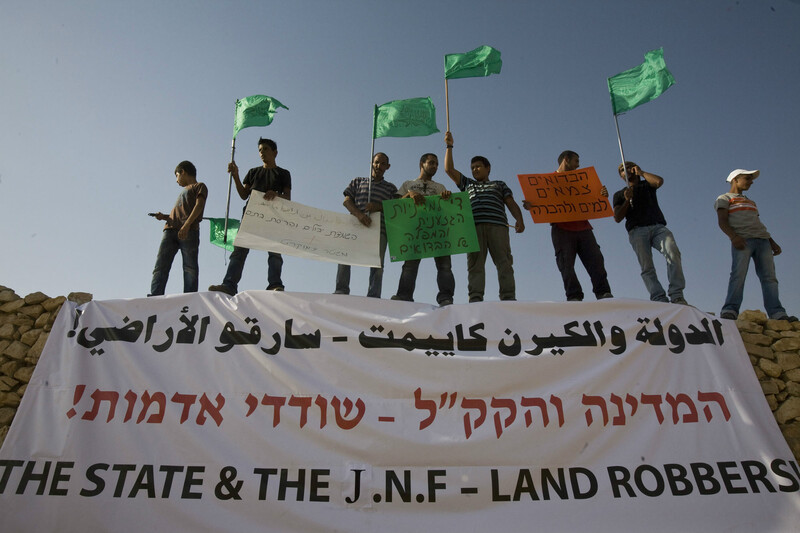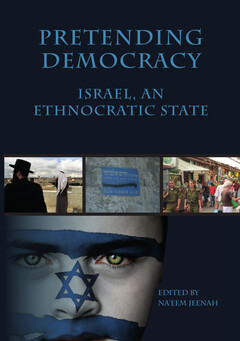The Electronic Intifada 4 June 2012

Israel has been institutionalizing the displacement and dispossession of Bedouins in the Negev/Naqab.
ActiveStillsThe question of using courts and litigation in struggles against oppressive regimes is not a new one. The long process of disassembling the South African apartheid state involved frequent and extensive debate on the important role of judges. Litigation on the part of the Palestinian minority in Israel and their rights, however, requires the consideration of an especially complex situation.
This minority is stranded in a unique situation in which the settler-colonial state, which defines itself exclusively as “Jewish and democratic,” also seeks to be, or at least to appear to be, a liberal democracy. It attempts this by granting the members of the minority some limited rights as individuals, at the same time preserving the de facto and de jure hegemony of the Jewish majority. The result is an institutionalized system of discrimination.
This creates a paradox regarding the use of the legal system to protect the rights of the indigenous population. On the one hand, the Israeli courts are part of this ethnically-defined state. Not only have they failed to challenge the Zionist definition, but they are also among its main promoters. Any question examined or remedy provided by the courts is limited by the ceiling of the “Jewish and democratic” definition, and will only be approached from a Zionist, settler-colonial perspective.
If one accepts that the problem is structural — that is, that the definition of Israel as “Jewish and democratic” renders the whole political and legal structure biased — then one is naïve to hope to achieve meaningful redress through the Israeli court system. (By the definition of “Jewish and democratic,” I do not only mean the formal positive definition put on the statute books by Israel’s parliament, the Knesset, but the ideology, assumptions, mindset, policies and practices that this definition embodies and represents in constitutional form.)
On the other hand, in select peripheral issues that do not challenge or affect the core issues related to the “Jewish and democratic” definition, some redress is possible through the opening created by the semblance of liberal democracy. These results, in turn, offer a facade of normalcy that lends legitimacy to the whole system, its structural biases included, by creating the impression that the democratic system is working and that the minority is benefiting from it.
In other words, any gains made on peripheral issues, possibly seen as incremental steps towards equality, serve to reinforce and legitimize the “Jewish and democratic core,” which in turn continues to regenerate unequal treatment. Real and meaningful equality becomes ever more distant. As the poet Audre Lorde reminds us: “the master’s tools will never dismantle the master’s house.”
Exposing structural bias
This question, however, is academic. Even if Palestinian human rights organizations halt their use of the courts, Israeli organizations will continue to use them, and it is likely that they will have some success in peripheral issues. Similarly, absent alternative avenues, individual Palestinians are likely to continue to use the legal system to address the inequities they face, and so the legitimization will continue. Given that legitimization seems to be inevitable, it may be useful for Palestinian organizations to use the legal system if they focus on the core issues and challenge the “Jewish and democratic” definition and its consequences.
Of course, any practical outcome of such an approach will likely be minimal, but it could prove useful if embedded in the broader and longer-term political struggle in which the main actor is the Palestinian minority, acting locally as well as internationally. Considered in this way, losses in court cases challenging the “Jewish and democratic” definition and its implications could be turned into opportunities to expose the structural bias of the Israeli system and its consequences for the Palestinian minority. This could be used as a tool of local and international political mobilization towards questioning the legitimacy of a legal and political order that excludes 20 percent of its population.
The options offered by international law are also limited. Nonetheless, there are innovative ways to heighten the international legal exposure of the injustice faced by the Palestinian minority in Israel, but to bear fruit, such efforts must be part of a broader political struggle.
Infusing a sense of unity
Therefore, the international struggle is still a chiefly political one. For political action to be effective, it is essential that it be carried out through an elected body representative of the Palestinian minority. This body would have the authority to speak on behalf of Palestinians in Israel, and would democratically formulate plans of political action domestically and internationally. It need not replace the existing political parties, but it could be a forum through which the plurality of party agendas is transformed into a unified program.
Such a body would increase domestic mobilization and infuse a sense of unity among the Palestinians. It could also be active in international advocacy, joining forces with the existing networks of Palestinian solidarity, enabling further support of their work, acting as both liaison and platform, and highlighting the unity of the Palestinian people.
The best way to avoid legitimization is to pursue a dual policy, internally mobilizing people to challenge Israel’s policies and definition on one end, and externally acting as advocates to bring attention to and expose the inherent flaws of the legal and political order on the other. The need to focus on a political strategy that includes an international dimension grows ever more urgent. The propensity of the Knesset to target the Palestinian minority continues to grow, with racist and discriminatory bills and laws frequently introduced.
The apartheid situation under which the Bedouin community in the Naqab (Negev) lives will be intensified with the planned introduction of new legislation to institutionalize their displacement and dispossession.
At the same time, the Israeli high court is reluctant to provide redress, as demonstrated by its recent rejections of the petitions challenging the Citizenship Law and the Nakba Law.
The emerging trend is a high court that, at best, is reluctant to intervene, and at worse, provides the Knesset with a blueprint for what the court sees as an acceptable margin of discrimination. This trend further comes to light through a thorough reading of the recent decision on the Citizenship Law. This trend will likely intensify in the future, highlighting the urgency of a strategy to transform losses in these cases (and others) into tools of political struggle locally and internationally.
A version of this article was originally published in Jadal, the bimonthly publication of Mada al-Carmel, the Arab Center for Applied Social Research.
Mazen Masri is a Ph.D. candidate at Osgoode Hall Law School, York University.



